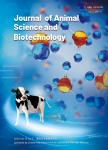Stage-specific nutritional management and developmental programming to optimize meat production
作者机构:College of Animal Science and TechnologyNanjing Agricultural University210095 NanjingPR China Nutrigenomics and Growth Biology LaboratoryDepartment of Animal SciencesWashington State UniversityWA 99164 PullmanUSA Laboratory of Perinatal KinesioepigeneticsDepartment of ObstetricsGynecology and Reproductive SciencesUniversity of Maryland School of MedicineMD 21201 BaltimoreUSA School of Food ScienceWashington State UniversityWAPullmanUSA.
出 版 物:《Journal of Animal Science and Biotechnology》 (畜牧与生物技术杂志(英文版))
年 卷 期:2023年第14卷第2期
页 面:451-464页
核心收录:
学科分类:0832[工学-食品科学与工程(可授工学、农学学位)] 08[工学] 083203[工学-农产品加工及贮藏工程]
主 题:Adipose tissue Embryonic development Fetal programming Fibro/adipogenic progenitors Marbling Nutritional regulations Skeletal muscle
摘 要:Over the past few decades,genetic selection and refined nutritional management have extensively been used to increase the growth rate and lean meat production of ***,the rapid growth rates of modern breeds are often accompanied by a reduction in intramuscular fat deposition and increased occurrences of muscle abnor‑malities,impairing meat quality and processing *** stages of animal development set the long‑term growth trajectory of ***,due to the seasonal reproductive cycles of ruminant livestock,gestational nutrient deficiencies caused by seasonal variations,frequent droughts,and unfavorable geological locations nega‑tively affect fetal development and their subsequent production efficiency and meat ***,enrolling live‑stock in nutritional intervention strategies during gestation is effective for improving the body composition and meat quality of the offspring at *** crucial early developmental stages include embryonic,fetal,and postnatal stages,which have stage‑specific effects on subsequent offspring development,body composition,and meat *** review summarizes contemporary research in the embryonic,fetal,and neonatal development,and the impacts of maternal nutrition on the early development and programming effects on the long‑term growth performance of *** the developmental and metabolic characteristics of skeletal muscle,adipose,and fibrotic tissues will facilitate the development of stage‑specific nutritional management strategies to optimize production efficiency and meat quality.



